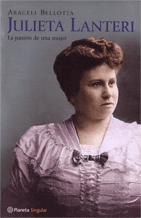Julieta Lanteri (1873-1932)
Thesis: Contribución al estudio del deciduoma maligno. Thesis (doctoral)–Universidad Nacional de Buenos Aires, 1906. PDF

Julieta Lanteri was born in Cuneo, Italy on March 22, 1873 to Antonio Lanteri and Matea Guido. When she was six, her family moved to La Plata, Argentina. She was the first woman to enter the National College in La Plata, where she received a degree in Pharmacology in 1898. After completing her Bachelor’s she attended the Universidad Nacional de Buenos Aires. She graduated in 1906, presenting her thesis Contribución al estudio del deciduoma maligno. She was the sixth woman to receive her medical degree in Argentina.
During medical school, she worked in the women’s ward of the Hospital San Roque, and after graduating she worked in the Emergency Hospital and Dispensary for ten years. She specialized in the treatments of mental disease and diseases of women and children. She studied in the psychiatric wards of the hospitals where she worked, and applied for a professorship of psychiatric ailments at the Medical School, but was rejected because she was not an Argentine citizen. From 1907 to 1920, Lanteri traveled frequently to Europe to study standards in hospitals, asylums, and schools. When she returned to Argentina, she worked to implement healthcare reforms to improve care for women, children, and unmarried mothers.
Lanteri not only worked in the field of medicine, she was also a prominent social reformer and suffragette in Argentina. In 1905, she was involved in the establishment of the Argentine Association of Free Thought, and, in 1909, she founded the National League of Women Freethinkers and its journal The New Woman. In 1910, she helped organize the first International Women’s Congress and she later helped organize the first National Child-Welfare Congress. After being declined for the professorship at the Medical School, she applied for Argentine citizenship, but was denied because she was an immigrant. Immigrant women were not generally granted citizenship in Argentina unless it was as a favor to their husbands. In 1910, Lanteri married Dr. Albert Renshaw, who was able to gain citizenship for his wife in 1911.
After becoming an Argentine citizen, Lanteri voted in the 1911 July elections for Deliberative Council, becoming the first woman to vote in South America, although women were not granted the right to vote in Argentina until 1947. After 1911, Electoral Law was changed in Argentina so that military service (something required of all male Argentine citizens) was required to vote, again eliminating women. Finding herself unable to vote, Lanteri instead formed her own political party, the National Feminist Union, in 1918, and in 1919, and every election thereafter, she ran for National Deputy. Her political party’s platform called for universal suffrage, male-female equality under the civil code, legislation regulating working hours, equal pay, pensions, maternity benefits, and protection of women and children workers, professional training for women, specialist care for delinquent children, prison reform, the abolition of capital punishment, social hygiene, greater safety regulation in factories, bans on the manufacture and sale of alcohol, prophylactic treatment of infectious diseases, and bans on regulated houses of prostitution.
In 1929, Lanteri attempted to join the military, and then argued before the Supreme Court that, since military service was required for all citizens (the law did not specify only male citizens) that women should be allowed to sign up for military service and, therefore, vote. She was denied this request as well. She continued fighting for women’s rights and running for National Deputy until 1932, when, on the 23 of February, she was run over by a car and killed. It is still debated whether this incident was an accident or a political murder. More than 1,000 people attended her funeral.
Sources:
Bellotta, A. Julieta Lanteri. Buenos Aires: Planeta, 2001.
Carlson, M. ¡Feminismo! The woman’s movement in Argentina from its beginnings to Eva Peron. Chicago: Academy Chicago, 1988.
Parker, W. B. ed. “Julieta Lanteri de Renshaw.” Argentines of to-day, 40-42. Buenos Aires: The Hispanic Society of America, 1920.
Rappaport, H. “Lanteri-Renshaw, Julieta.” Encyclopedia of women social reformers, 385-386. Santa Barbara: ABC-CLIO, 2001.
Augustine-Adams, K. “She consents implicitly: women’s citizenship, marriage, and liberal political theory in late-nineteenth- and early-twentieth-century Argentina.” Journal of Women’s History 13 (4): 8-30, 2002.
“Julieta Lanteri,” Wikipedia. https://es.wikipedia.org/wiki/Julieta_Lanteri (accessed January 4, 2007).
“Timeline of women’s suffrage,” Wikipedia. https://en.wikipedia.org/wiki/Timeline_of_women%27s_suffrage (accessed January 4, 2007).
“Julieta Lanteri, una precursora de los derechos de las mujeres,” La Fogata. http://www.lafogata.org/mujer/cra_julieta.htm (accessed January 4, 2007, no longer available as of September 17, 2014).
Biographies of selected authors from the New York Academy of Medicine Collection of International Medical Theses written by Amanda Allgood, B.A., M.L.S.






